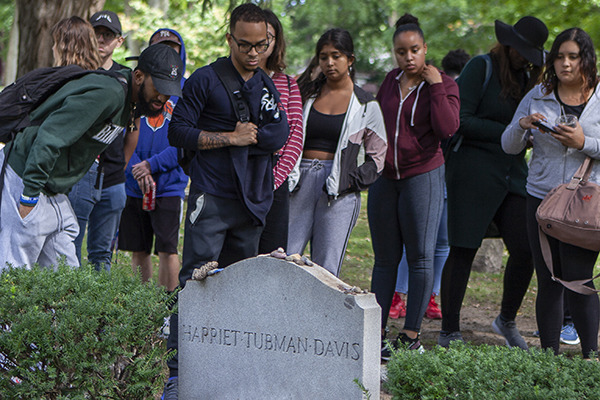Harriet Tubman legacy focus of field trip
Students in the Black Families course traveled to the Harriet Tubman Home in Auburn, N.Y. to explore history.

Beginning with her life story, the students of the Black Families course learned that Harriet Tubman made history — just 90 minutes away from Binghamton University at the Harriet Tubman Home in Auburn, N.Y.
“When I was at [the Harriet Tubman] home, I was trying to put myself in her shoes,” said Ada Cheng, a sophomore double majoring in mathematics and human development. “Like blood, sweat and tears just streaming down her face. This happened here, which is pretty surreal to me. We live an hour and a half away. We live so close to where history happened.”
Leo Wilton, professor of human development, teaches the Black Families course. He brought the class on the excursion to help students understand the socio-historical, political,and cultural contexts of contemporary issues that Black communities face today.
“This trip allows us to make an in-depth examination of black families within the local context,” Wilton said.
Tubman, a prominent person in the abolitionist movement, led hundreds of enslaved Africans to freedom through the Underground Railroads. At the end of the railroads, Tubman and her allies established havens for people to live. One of those destinations was Auburn, and today, it is where the Harriet Tubman National Historical Park is located. The Black Families course field trip was sponsored by the Department of Human Development, which covered expenses for the bus and entrance fees.
One of the topics students explore in the course is that of black extended families and kinship networks.
Ewuraba Annan, a senior human development major and Africana studies minor, said the trip helped her understand the structure of black communities.
“It’s really powerful,” Annan said. “The idea of keeping families together and freeing enslaved people. There is an importance of keeping your connection to your people, in her [Tubman] being able to bring her own family, and then bring other families, to freedom.”
For some students, the trip was also a realization that key historical locations in the United States are not as distant as they had imagined.
In Cheng’s case, she did not previously know about the Harriet Tubman Home.
Wilton attributes this lack of knowledge of local history to the void in educational opportunities to learn about African American history.
“Black history gets marginalized within the curriculum,” Wilton said. “Why don’t more people know about this history that is in New York? More courses should explore some of these dynamics. Not just in the context of black communities but other communities as well.”
Exposure to Tubman’s story also taught the students moral lessons with some admiring Tubman’s perseverance. For instance, Cheng highlighted Tubman’s resilience during her lifetime.
“Harriet Tubman used to put others above herself,” Cheng said. “She had to fight for her freedom and had to fight for other people’s freedom. I think that’s just really inspiring. Even as she got older, she still wanted to have a home for not just the black families, but for the white families as well. She’s just amazing; that’s what I learned.”
Above analyzing how Tubman’s life aligns with the Black Families course, the students grasped that Tubman’s lifelong fight could translate to today’s world.
“Seeing how Harriet just wanted her freedom and then realizing that she could do it for so many others,” Annan said. “It’s a good reminder that the little actions you can take might end up making a big difference in the long run. Remember that you are a part of history. To an extent, you have a responsibility to change the future.”
Wilton said that he wants his students to understand the important role of resilience that brought enslaved Africans to freedom.
“This serves as a foundation for thinking about how Black families navigate structural inequalities that they experience every day,” Wilton said. “Some of these contemporary issues include educational, housing and employment inequalities; incarceration; inadequate access to healthcare; as well as stigma and discrimination.”
